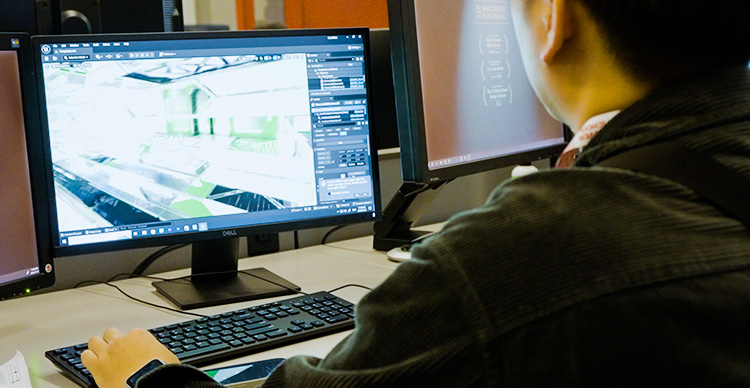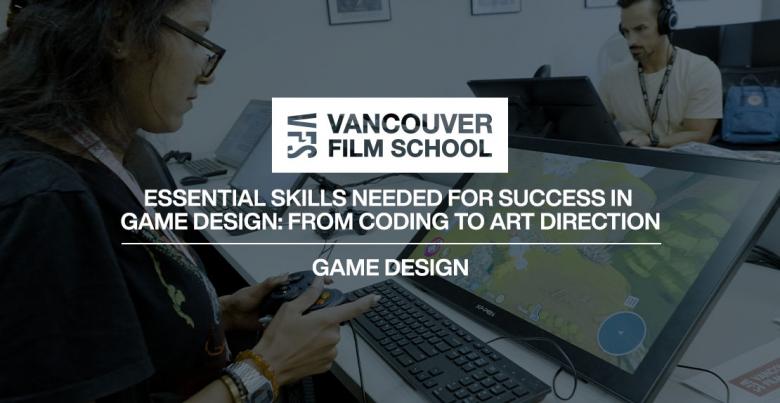Key Takeaways
- Programming proficiency forms the foundation of game development, allowing designers to implement complex gameplay systems and mechanics effectively
- Understanding game design theory and principles helps developers craft balanced, engaging experiences that keep players invested through well-crafted storytelling techniques for interactive media.
- Building a professional portfolio showcasing diverse skills significantly increases employment opportunities in the competitive programming for games industry .
Game design combines creative vision with technical expertise, requiring professionals to master a diverse range of skills to succeed in this competitive industry. Vancouver Film School offers intensive game design training through our comprehensive Game Design program, where students experience the entire game development cycle and develop specialized skills in coding, game art, and level design. As Canada's #1-ranked game design institution, Vancouver Film School equips aspiring game creators with the technical proficiency, artistic capability, and industry connections needed to launch successful careers in the global gaming industry.
MASTERING CODING LANGUGE TRANSFORMS GAME DEVELOPMENT PROCESS
Programming skills serve as the essential foundation for successful game designers, enabling them to implement complex gameplay systems, optimize performance, and translate creative concepts into playable experiences. Game development professionals need to master languages like C++, C#, and JavaScript, along with understanding game engine frameworks like Unity and Unreal Engine that streamline the development process through built-in tools and systems. While some roles in game design require less technical coding expertise, even designers who focus on creative aspects benefit from understanding programming fundamentals to communicate effectively with development teams and recognize technical constraints that affect gameplay implementation.
Vancouver Film School Teaches Industry-Standard Programming Tools
Vancouver Film School equips game design students with comprehensive training in industry-standard programming tools, focusing primarily on Unity and Unreal Engine development environments used by professional studios worldwide. Our curriculum balances theoretical knowledge with hands-on application, allowing students to develop C++ programming expertise while building practical skills through the creation of mobile games, web applications, and desktop experiences. Students graduate with a robust programming portfolio that showcases their technical abilities to potential employers, demonstrating proficiency in game engine expertise that aligns with current industry demands.
Top Programming Languages and Tools for Game Development
- C++ remains the industry standard for AAA game development, offering powerful performance optimization capabilities.
- C# serves as the primary programming language for Unity engine development, balancing ease of use with robust features.
- JavaScript enables web-based game development and enhances interactive elements in browser games.
- Python provides rapid prototyping capabilities for testing game mechanics and systems. Unreal Engine
- Blueprint visual scripting system allows designers to implement gameplay logic without traditional coding.
- Unity's extensive asset store offers pre-built components that accelerate development timelines.
- Version control systems like Git help teams manage code changes and collaborate effectively.
ART DIRECTION ELEVATES PLAYER EXPERIENCE BEYOND MERE GAMEPLAY
Art direction fundamentally shapes how players perceive and connect with game worlds, establishing visual language that communicates tone, setting, and emotional context without relying solely on dialogue or text. Successful game art directors combine technical understanding of visual aesthetics with strong leadership skills, guiding teams of artists to create cohesive environments, character designs, and visual effects that maintain stylistic consistency throughout the entire player experience. The visual design elements within games significantly impact player engagement by creating memorable moments, establishing unique artistic identities that distinguish titles in the marketplace, and reinforcing gameplay mechanics through visual feedback that intuitively guides players through the experience.
Creating Distinctive Visual Identities for Memorable Games
A game's visual identity becomes truly memorable when it establishes a unique artistic perspective that players can instantly recognize, combining distinctive stylistic choices with consistent application across all visual elements. Professional game artists develop unique art styles through extensive concept art pipeline exploration, experimenting with different approaches while maintaining a core visual language that supports the game's thematic and emotional goals. Industry-standard tools like Adobe Creative Suite, ZBrush, and Substance Painter enable artists to create consistent visual aesthetics across characters, environments, and interface elements, establishing visual identity creation processes that support the game's narrative and gameplay objectives.
 VFS Game Design students build new worlds from scratch during their 1-year program.
VFS Game Design students build new worlds from scratch during their 1-year program. GAME DESIGN THEORY FORMS FOUNDATION FOR INNOVATIVE GAMEPLAY
Game design theory encompasses fundamental principles that govern player engagement, including concepts like flow state, risk/reward balancing, and psychological motivation that drives continued play. Successful designers apply these gameplay loop design principles to create experiences that challenge players appropriately while maintaining a sense of achievement and progression, tapping into player psychology understanding to craft systems that feel both fair and compelling. Beyond basic concepts, professional game designers must develop deep knowledge of interactive design theory, studying successful mechanics across genres and understanding how to adapt these principles to create innovative gameplay experiences that stand out in a crowded marketplace.
How Does Vancouver Film School Approach Game Design Theory?
Vancouver Film School offers comprehensive game design theory courses that balance theoretical concepts with their practical application, emphasizing production-based learning through real-world project development. The industry-focused curriculum connects abstract design principles with concrete implementation techniques, creating a bridge between conceptual understanding and practical development through mentorship opportunities with experienced industry professionals. VFS students apply design theories directly in collaborative game projects, developing practical skills through hands-on game level creation that builds a portfolio development process demonstrating both theoretical understanding and implementation expertise.
COMPELLING STORYTELLING ENHANCES GAME DESIGN SUCCESS DRAMATICALLY
Interactive narrative design offers unique storytelling possibilities that traditional media cannot match, allowing players to actively participate in and shape stories through meaningful choices that create personalized experiences. Game narratives employ specialized techniques like environmental storytelling, where the world itself communicates narrative elements through visual cues, architecture, and discovered artifacts that reward exploration and observation. Different game genres utilize storytelling to varying degrees – with role-playing games often featuring complex character development strategies and branching dialogue systems while action games might focus on emotional engagement methods through cinematic sequences and simplified narrative structures that complement fast-paced gameplay.
Writers Transform Traditional Narratives into Interactive Experiences
Writing for games differs fundamentally from other media by incorporating player agency consideration, requiring writers to develop branching narrative structures that accommodate multiple possible player choices while maintaining coherent storylines. Successful game narrative designers develop specialized skills in interactive dialogue writing that sounds natural across different potential conversation paths, along with creating comprehensive narrative design documentation that helps development teams implement complex story elements consistently. The most effective game writing emerges from close collaboration between writers and designers, blending creative storytelling with technical implementation to create emotional journey mapping that guides players through meaningful narrative experiences.
VANCOUVER FILM SCHOOL DEVELOPS 3D ANIMATION SKILLS FOR GAME DESIGN
Animation skills provide essential value to game designers by bringing characters and environments to life through believable movement that enhances player immersion and emotional connection. Game animation integrates with the broader design process through specialized systems like animation state machines that control character behaviors based on gameplay conditions, creating seamless transitions between different actions and reactions. Aspiring game animators should prioritize learning industry-standard software including Autodesk Maya, Blender, and motion capture understanding tools, focusing on both technical proficiency and animation principles like weight, timing, and anticipation that make movements feel authentic within the game world.
Students Create Professional Animation Portfolios Through Practical Projects
Vancouver Film School challenges animation students to complete diverse projects that showcase versatility across character animation focus, environmental animation, and visual effects training applicable to various game genres. The program specifically prepares animation portfolios for the game industry by emphasizing technical considerations unique to interactive media, including optimization techniques, game engine integration, and the creation of animation cycles that function effectively within gameplay systems. VFS offers specialized tracks in animation specialization that allow students to develop expertise in areas like character movement, immersive environment creation, or effects animation, building comprehensive demo reel development that showcases both technical skill and creative vision to potential employers.
Vancouver Film School stands at the forefront of game design education in Canada, providing students with the diverse skill set required to excel in this multifaceted industry. Our Game Design program integrates technical training in programming, art direction, design theory, storytelling, and animation through a production-focused approach that mirrors professional studio environments. Prospective students can explore additional creative programs at Vancouver Film School that complement game design skills, creating well-rounded professionals ready to make their mark on the global gaming industry.
